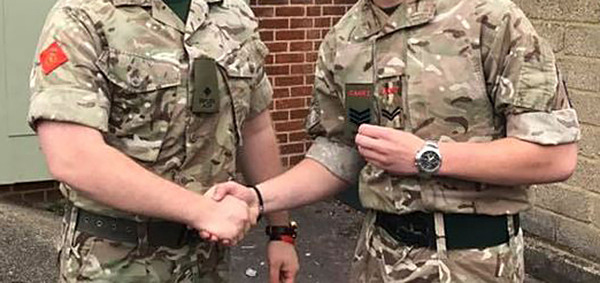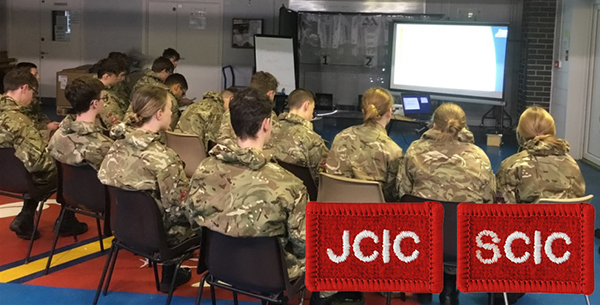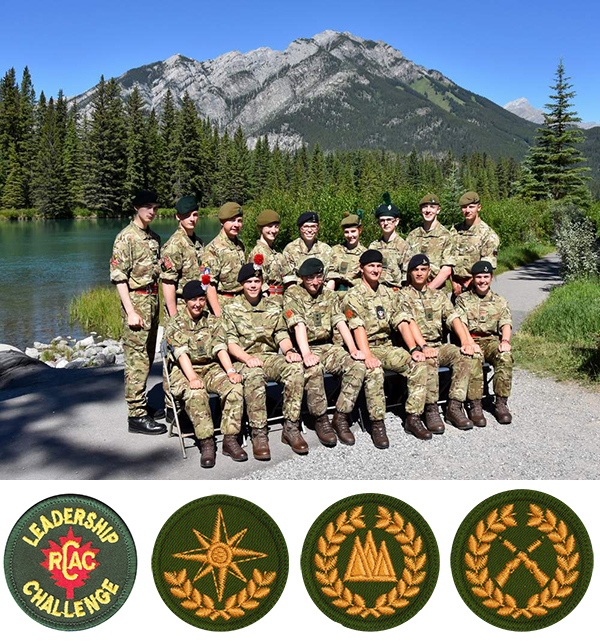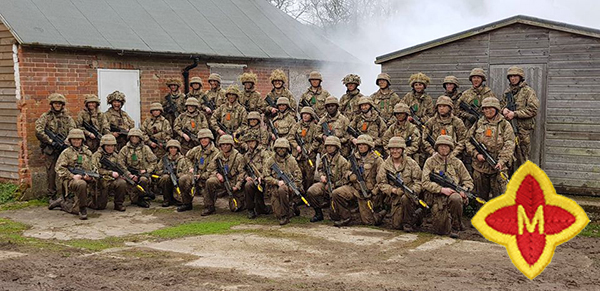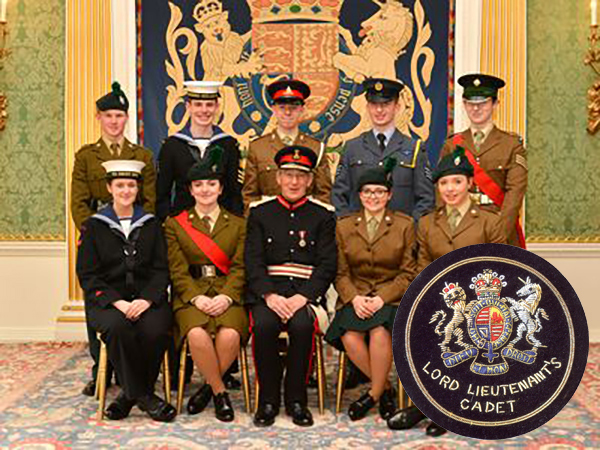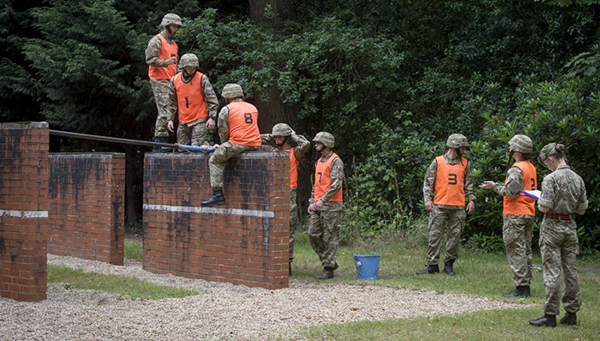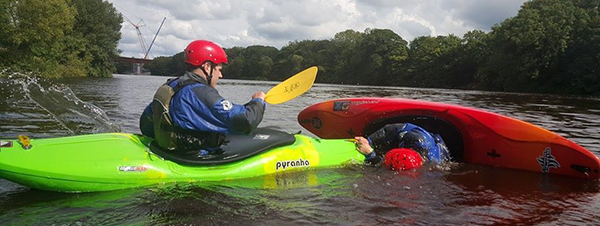Blog
Cadet Career Development - Find out how to progress
Every Cadet has the opportunity to earn promotion and develop their cadet career, the skills and abilities you require can only be developed by training and practice.
To a great extent your opportunity for promotion is entirely in your hands, from your first Parade night your attitude towards your mates, how you respond to being given instructions and how well you carry them out can impact your career within cadets. Some of the essential qualities are:
- Loyalty and pride in the Regiment or Corps to which you are badged, your County and Detachment and the Army Cadet Force.
- Enthusiasm in all that you do, encouraging other Cadets to imitate you.
- Sense of humour: especially when things go wrong. Do not laugh AT others; laugh with them.
- Initiative to anticipate what will be required of you.
- Knowledge of your subjects – giving others confidence in your ability
- Instructional ability, watch and learn from good instructors
- Self discipline in the way you behave
- Reliability is important, if you say that you will do something, DO IT
- Good manners are never forgotten
CADET CAREER PROMOTION IS NEVER AUTOMATIC
Promotion is related to your qualifications as well as your ability. You will need to achieve the standards set out below and be recommended for consideration as a candidate for promotion, to progress your cadet career, by your Officers and Instructors.
Cadet Lance Corporal - Has to passed One Star
Cadet Corporal - Has to passed Two Star
Cadet Sergeant - Has to passed Three Star
Cadet Staff Sergeant - Has to passed Four Star
Cadet Regimental Sergeant Major - Has to passed Three Star
Master Cadet : having attained your Four Star, completed the Master Cadet Course at Frimley Park, and subsequently been recommended by your County Cadet Commandant.
Cadet Under Office : ACF County Commandant may appoint a 4-star cadet as a Cadet Under Officer if he or she is thought to have officer potential and is in the last year as a cadet.
PROMOTION CADRES
Most County Cadet Forces take the promoting of their Cadets very seriously, they have a system of promotion courses similar to the Army system; these courses are called NCO’s Cadres.
The Cadres are usually organised over a weekend or perhaps at Annual Camp. This is when potential NCOs are brought together and given the opportunity of showing how the have developed, not only in their APC skills, but to see how they behave when with their fellow candidates. The Cadre usually follows the form of planning and taking lessons, command exercises, lecturettes, initiative tests, games and other activities.
Cadets who have taken part to enhance their cadet career usually say that it is great fun and a good method of finding out their strengths and weaknesses. To see how you behave under different circumstances and conditions. All the Officers and Instructors make an assessment before final recommendations are made concerning your suitability as an NCO.
CADET NCOs - Duties and Responsibilities
Junior N.C.O.
You will learn how to instruct the basic APC subjects and also how to take command of a squad.
With the other NCOs in the Detachment you are responsible to your Detachment Commander to assist with the organisation and smooth running of your Detachment at the level of your rank.
When you earn your first stripe, it is easy to start “throwing your weight around”. The first to know about it are the mates who were happy to have a laugh with you before, but now avoid you. It could be that they respect your promotion, however you have to prove to them and yourself that you are worthy of it. This is a good time to consider some of the actions and failings of bad Cadet NCOs.
FAILINGS
- Intimidate individuals by shouting at them, particularly when standing close up to them.
- Making personal contact (touch) when addressing them.
- Use foul language, make offensive personal remarks about an individuals background, height etc, or make threats of what might become of them.
- Make an example of an individual by punishing without due reason, or belittling them in front of others.
- Keep picking on an individual in front of others. If they are persistent offenders, not reporting an individual for OC to deal with.
- Borrowing money or asking favours of Cadets.
- Not sharing duties or “chores” fairly, not having a duty roster displayed.
- Being late with orders/information, not allowing time for all to respond.
- Asking Cadets to clean, press etc. your personal kit or equipment.
- Not reading Orders, being un-informed of duties, events.
- Fail to check untidy Cadets and/or their rooms.
- Always late for parades and duties.
- Puts off dealing with complaints and problems reported to them.
- Does not praise or give encouragement for good work.
- Passes on responsibilities to others, lacks personal discipline; does not bother to prepare lesson plans.
- Using first names when “On Parade” – difficult, but surnames should be used.
- Failing to report serious breaches in discipline, theft, illegal substance taking, Cadets out of bounds.
- Sets a bad example by being untidy in uniform and civilian clothes.
- Throwing their weight about, always going to the front of the queue in the NAAFI or Dining Hall.
- Behaviour either as an individual or a member of a group that may harm the reputation of the ACF and the Detachment.
No doubt you can think of many more, make sure you are not guilty of them!
Senior N.C.O.
As a Senior Cadet NCO in your Detachment you have responsibilities at all times; on or off Parade. In any activity where Cadets are involved or it is known that you are a member of the Army Cadet Force.
You will be directly responsible to your Detachment Commander for the Cadets in your Detachment.
Delegation of Responsibility
The Detachment Commander and Instructors in your Detachment ‘share’ some of their authority in running the Detachment with you. This means that they must be seen to give you the backing or authority to carry out tasks within the Detachment leaving you to probably make mistakes. This is all part of the learning curve; providing you do learn from your mistakes.
In return your Detachment Commander and Instructors will expect you to measure up to the trust they have in you.
DEVELOPING YOUR ABILITY AS AN NCO
RESPECT AND DISCIPLINE IS NOT A RIGHT, IT HAS TO BE EARNED
Respect and discipline are together; one cannot exist without the other. How can you gain respect? There are two ways firstly through fear, by proving you are bigger, stronger, can hit harder and swear better. To put it briefly, by being a bully.
Secondly, by gaining the Cadets trust and through that their respect.
In America in 1940, they needed one million managers to run their war effort. They were aware of the need for good relations in the work place, resulting in the introduction of the “Foundation For Good Relations”. They have been converted into “Cadet speak” as follows:
- Let your Cadets know in advance of things that affect them; what’s on, date, time, place and the reason why it is being done.
- If someone does well – give him or her the credit for it when it is due – at the time, NOT afterwards.
- NEVER criticize or check other NCO’s or Cadets in front of assembled Cadets.
- Always take the individual “out of earshot” of others if you are to reprimand them.
- Recognise the ability of other Cadets and NCO’s, give them every opportunity to show and use their talents.
If Cadets know that you will ensure they are kept informed, trust, respect and good teamwork will follow. Listen to those who supervise you both now and throughout your career. You will know immediately those who value Good Relations and the importance they place upon it.
Following the Foundation For Good Relations requires the same control as remembering not to swear, shout or discipline for every minor offence; self-discipline. Use the trust and respect you have earned to control your Cadets; not shouting or using discipline unnecessarily.
WORKING WITH SUBORDINATES
Unlike your counterparts in the Regular or Territorial Army, you have no power to order any form of punishment. Physical punishment such as ‘push ups’ or making the Cadet look small in front of other Cadets is not allowed. NEVER touch, i.e. personal contact, strike, push trip up or in any other way deliberately touch a subordinate Cadet, it could result in legal action being taken, and it is a form of bullying.
When a Cadet’s uniform needs adjusting, let them do it themselves, that way they learn by their mistakes.
DISCIPLINING A CADET
When disciplining a Cadet, ensure that the reprimand is not made in the hearing or presence of others and that it is done at the time or immediately after the incident. Where possible, use constructive criticism, for example, a Cadet is fooling about in a lesson, when you speak to him/her you could say; “You have been doing so well at (whatever subject they are good at), I am disappointed that you are not making the same effort in (whatever subject the lesson is), I expected better of you”. It takes practice to get constructive criticism right, but it really does work well if your Cadets have respect for you as an NCO.
BULLYING
Bullying comes in many forms, and most of us have been victims, perhaps without realising it.
Earlier on in this article there is a list of some of the actions of a bad NCO, many of these are recognised as bullying. As an NCO you must guard against appearing to “pick” on a particular Cadet, it gives them bad feelings about the Cadet Force and it IS bullying. Issuing threats and promises is another common form of bullying and an easy trap to fall in to. As a senior Cadet NCO, watch newly appointed junior NCOs to ensure they get it right from the start and follow the Foundation For Good Relations.
Bullying destroys a person’s self esteem; it makes them withdraw from the ‘team’, lose interest in activities, and stops them attending Detachment Parades. If you recognise the signs in a Cadet, report it.
As an NCO you will perhaps find a junior Cadet “Disclosing”. This is the term used for a child or young person admitting to physical or mental abuse against them. If this occurs, you must tell the Cadet concerned that you have to inform your Officer in Charge. DO NOT try to deal with the problem yourself, or talk to anyone other than the people in charge, it is a serious matter and requires official action.
WHEN YOU MAKE MISTAKES - It Happens!
The more inexperienced you are, you tend to make more mistakes and can be reprimanded by your superiors. At this time you may feel a that your reprimand wasn't warranted and unfair. Stop at this point and think! Don't sulk, or feel someone has a ‘dist you’, accept that the reprimand was carried out in good faith and for you to learn from it. However, if the matter is serious and you genuinely were not at fault, do not complain to everyone within earshot. Accept the reprimand then gather your facts together, ask for an interview with the Officer or Instructor concerned - in private and present your facts.
ATTITUDE TO ORDERS
There are times when you will be required to carry out an order given by a superior which you know will be unpopular with the Cadets. This order should be given as ‘your order’, never apologise for it, just carry it out to the letter. If it is an order or instruction that you disagree with, carry it out, gather your facts and evidence in logical sequence and present them to the Officer or Instructor concerned. Use the procedure described in ‘when you make mistakes’.
Should you be given an order or instruction which through the individual’s lack of specific knowledge or experience is illegal, dangerous or in contravention of safety rules, then in spite of the individual being of superior rank, it would be important to point out the facts to them. Try and do this away from other people if possible, but safety is paramount, you cannot be ordered to break safety rules.
COURTESY TO SUPERIORS
At times you may find it difficult to give the respect due to certain Officers and Instructors in your County. It helps to remember that you are giving respect to their rank not the individual. Question yourself about why you feel the way you do, what is it about the individual’s behaviour/attitude; ensure that you do not make the same mistakes and continue to give the rank the respect it requires.
THE PARADE GROUND
In some Regular Army units you may find that the square is the ‘personal property’ of the RSM and is only used for drill parades and should NEVER be walked across in a casual way. It perhaps would be as well to assume this when visiting a Regular Army base and ensure that all Cadets are encouraged to follow your example.
OFFICER’S, WARRANT OFFICERS & SERGEANT’S MESS

Many Counties arrange for the more senior Cadets (3 and 4 Star) to visit the Mess on the afternoon prior to their formal Mess Dinner. Your guide is usually a senior member of the Mess, who will explain the history of the Mess silver, procedures and etiquette that is expected from Mess Members when attending a Mess Dinner. These dinners are usually formal, and follow the Regular Army in format.
Some of the more senior Cadets will be invited to ‘wait on table’ for Mess Dinners, and may receive some training in what and how things are done.
- The Mess Steward will allocate your duties, you may be given a section of table to care for, or you may be given specific items to serve.
- You will be taken in to the Dining Room to familiarise yourself with the layout, where items are to be found and how your duties will be carried out.
- You may well assist in the placing of the cutlery and glasses, a sample layout of a “Dinner cover” or “Place setting” is shown further on in this section along with an explanation of how to ‘navigate’ the setting should you be invited to a formal dinner.
4. The evening commences: it is common practice for the diners to congregate at the Mess approximately 30 minutes before the Dinner is to commence. You will perhaps be asked to serve sherry to Mess Members and their guests. You will notice that no one is late for this ‘gathering’, it is seen as an insult to the Mess.
5. The Mess Steward will gain the attention of the Mess Members, (usually by a gong, and shouting out “Ladies and Gentlemen, Dinner is served”). The Senior Officers and Guests are allowed to enter the Dining Room first, followed by others in order of rank. The reason for this is clear when you study the Seating Plan, the more senior ranking Officers are nearest the ‘top table’ .it is therefore common sense as well as courtesy that they should enter the room first.
6. All remain standing until Grace is said, then when the top table is seated, all others take their seat. A note here, if there are female Mess Members or Guests, it is still seen as ‘good manners’ to pull her chair back and assist her to the seat. In some Messes, it is a ‘Waiter’ who performs this task, in others it is expected of a male diner seated next to her.
7. The Meal: The Mess Steward will ‘give the nod’ for you to begin serving food. You will be shown how to serve food; it is not as easy as it looks! No plates are cleared from any table until all the diners have completed the course.
8. Keep a sharp eye out for signals from diners, they may have dropped a knife or fork, spilt some wine etc. it is part of your duties to provide clean cutlery or a cloth for mopping should it be required.
9. Wine: If you experience problems with a Mess Member concerning the amount of wine he/she is demanding, be polite and quickly advise the Mess Steward who will take the appropriate action. Some Cadets take the opportunity to ‘refresh’ themselves with the nearly empty bottles of wine. TAKE CARE! You have probably been training in the morning, working in the Mess in the afternoon and will not get to bed until after midnight. Wine will cloud your judgment of distance, and make you sleepy. Keep alert, save the wine until the work is finished.
10. The Loyal Toast: Port is served to the Mess Members, watch for those who do not wish to have Port, they will require water in their glass in order to drink to the toasts called.
11. Leaving the Table: When the Senior Officers present and their guests stand to leave their tables, one of two things may occur, firstly, all other diners remain seated, or secondly, all other diners stand until the parties have left the Dining Room and moved to the Ante-room.
Hors d’Oeuvre: is a dish served as a relish at the beginning of a meal. If you are offered a selection, choose three or four; don’t aim to sample them all! They are eaten with both a fish knife and fork or with a tea spoon depending on the item, for melon, a dessert spoon and knife or fruit fork and knife are used.
Soup: taken with a round-bowled soup spoon. Drink your soup from the side of the spoon
- Tip the soup bowl away from you to finish the last of the soup
- The bread bun should be broken not cut
- Do not put the bread in your soup or use it to clean the soup bowl
- If you wish to use butter, butter a small bite sized piece of bread at a time.
Fish: use a fish knife and fork, if you have used your fish knife and fork for the Hors d’Oeuvre, and you have not been provided with ‘new’, ask the waiter for them.
- If the fish is on the bone, do not turn it over; you will never get the bones out!
- If you are unlucky enough to get a fishbone in your mouth, it is the only time you can remove it from your mouth with your fingers (unobtrusively behind your napkin).
Entrée: this is a dish served between the fish course and the main course, eaten with a knife and fork.
Main Course: self-explanatory, usually meat or poultry. If you find gristle or bone in your mouth, remove with your fork and place on the side of your plate.
Pudding: usually eaten with a spoon and fork. The fork may be used alone, but not the spoon unless a special spoon is provided for ice cream or fruit salad.
Dessert: are items such as petit fours (marzipan sweetmeats).
Fruit: eaten with a dessert knife and fork, normally cut up (or peeled), before eating. Use the finger bowl if provided, to clean sticky fingers, just dip them in the water and dry on your napkin.
Cheese board: usually with a selection of cheeses and biscuits. Take small quantities of three or four cheeses.
General Notes:
- Salt, Pepper and Mustard: salt should be placed on the side of your plate, not scattered over the meal, as pepper is. Mustard should also be placed on the side of the plate, do not tap the spoon on the plate to dislodge the mustard.
- Mess Silver: when dining in an Officer’s or Warrant Officer’s Mess, do not touch the Mess Silver. In some messes this can mean a fine.
- Other diners: always be mindful of their needs, ask if they require the salt, etc.
- Ask: do not reach far across the table for an item; ask for it to be passed to you, or request the waiter/steward to get it for you.
- Dropped cutlery: do not dive under the table, ask the waiter to provide clean.
- Talk to your neighbours: at either side and directly across the table, do not attempt to talk to a person where it means either shouting, or leaning in front of someone. This does NOT include catapulting peas or pieces of paper at them; it will earn you a severe telling off from the PMC. (President, Mess Committee).
- Napkins: at the end of the meal, rough fold it and leave on the table.
- General Behaviour: in some Messes, it is the custom that once the senior mess members and guests have departed, the junior mess members 'Let off steam'. This often includes finishing the port, playing forfeits etc.
Dancing on the table and playing football with the mess silver is not a recommended course of action - let others make that mistake! Excuse yourself and disappear.
The Table Setting (Dinner Cover Layout)
The Layout shown above shows a typical “Cover” or “Place setting” for a four-course meal. The following section is for those of you who wish to know how to ‘navigate’ the array of knives and forks, and check that they have the basic good table manners they will perhaps need for the future, when dining with the Managing Director of their company, or indeed if they decide to enter the Armed Forces (particularly as an Officer).
A Dinner usually consists of at least four courses; the cutlery is laid out in accordance with the menu and is used from the outside towards the centre. The napkin (not shown) should not be tucked into your shirt neck!

DINNER COVER LAY-UP
The diagram above of a cover lay-up or a place setting is related to the Menu. On studying any menu you can relate the items of knives, forks and spoons to be used with each course on the menu.
Start by using each pair of KFS from the extreme left and right of the place setting. (rule is work from the outside-in (both side towards your plate)).
The knife on the side plate is for spreading butter on pieces of a Roll or toast, NOT for cutting either.
Repeat - you always break a roll on your side plate using both hands, and if you wish to butter the Roll use 'bite-size' pieces and butter each piece as you eat them.
Junior Cadet Instructor Cadre
The Junior Cadet Instructor Cadre (JCIC) is an integral part of 3-Star training and all cadets at this level take the course. It is designed to teach the cadet how to instruct new entrants and 1-Star cadets in drill, turnout and military knowledge; map and compass; skill-at-arms and fieldcraft.
The JCIC has two purposes. Firstly it initiates the senior cadet into the techniques of instruction. Secondly it assesses the cadet’s ability as a potential instructor, with particular reference to his or her possible selection to undertake the Senior Cadet Instructors Cadre at 4-Star level.
SENIOR Cadet Instructor Cadre
The Senior Cadet Instructor Cadre (SCIC) is a 4-Star optional subject designed to increase your knowledge of the techniques of instruction, first introduced on the Junior Cadet Instructor Cadre (JCIC) and give you early experience of the art of leadership.
To qualify for the SCIC you must have sound knowledge of all subjects up to and including 3-Star level and you must have proved, by your performance on the Junior Cadet Instructor Cadre, that you are a potential instructor.
You will learn how to instruct up to and including 2-Star standard cadets in drill, turnout and military knowledge; skill-at-arms; fieldcraft; and map and compass.
UK Cadet Force Exchange to Canada
As part of the Royal Canadian Army Cadet (RCAC)/UK Army Cadets Forces bilateral exchange programme, a party of UK ACF Army Cadets (only) are invited to attend as students on the Cadet Leadership, Instructor Marksmanship course for a 6 week RCAC course in Canada. The UK Cadets are fully integrated within the RCAC Sections. Speak to your detachment commander about this exchange.
Master Cadet Course
Objective of the Master Cadet Course is to develop the leadership and military skills of Army Cadet Force 4-Star cadets.
Candidates must successful completion of the Master Cadet Course qualifies cadets for consideration for appointment to Master Cadet. Appointment as a Master Cadet is at the discretion of the ACF Commandant.
The course is 5 days long and its aim is to broaden and develop further the leadership, instructional and administrative responsibilities of 4-Star cadets, with the intention of making better use of their abilities. It also encourages the retention of senior cadets by giving them something to strive for beyond 4-Star. This is a physically arduous and mentally demanding course. Candidates must ensure that they are adequately prepared.
The course is open to ACF cadets only. All applicants must have completed fieldcraft as a progressive subject and have qualified on the Senior Cadets Instructors’ Cadre (SCIC). Students are to be at least 16.5 years old and at the minimum rank of Sergeant.
Pre-Requisites for all candidates must be shown as passed 4 star and hold an in date (valid for the duration of the course) Weapon Handling Test (WHT) certificate on the L98A2 Cadet GP Rifle and must be current. You must have completed and recorded completed the 4-Star fieldcraft and Senior Cadet Instructor Course.
It is recommended that students also undertake the following before attending the course. Have the level of fitness to endure and take part in 10 battle exercises per day, have complete understanding of Section Battle Drills, plan and conduct a fieldcraft lesson and be able to use an OS map in the day and night.
THE LORD LIEUTENANT’S CADET
There is a Lord Lieutenant appointed by Her Majesty the Queen for every County in Britain. It is an honorary appointment; the role is that of a personal representative of Her Majesty. In recognition of the appointment, the Lord Lieutenant is treated with due respect and courtesy. The Lord Lieutenant performs duties on behalf of the Queen, from attending events such as the annual Remembrance Parade, Military parades, functions, and open days, formally opening public buildings, hospitals etc. and supporting large scale public celebrations.
INTEREST IN THE CADET FORCES
As a mark of the Lord Lieutenant’s interest in the Cadet movements, many County Cadet Forces (Sea, Army and Air) are required to annually appoint a Lord Lieutenant’s Cadet. In the majority of counties, the Lord Lieutenants keep their Cadets very busy, accompanying them on many of their official engagements, acting as escort and carrying out minor duties on their behalf.
TOP JOB
This is a job for the ‘Top Cadet’ in the County. To be seen in public at the side of the Queens Representative requires an individual with special qualities; being a good Cadet can attain these. It is a particular honour to be selected as the Lord Lieutenant’s Cadet and carries with it the responsibility of representing all the members of the ACF in the County.
SELECTION
Most Counties have a nomination system followed by a selection board often held at Annual Camp. Cadets who wish to be nominated will probably have passed their APC 3 Star, be 16 years old, of particularly smart appearance, keen and at ease when talking to their seniors.
They will require an out-going personality and will probably have attained the rank of Cadet Sergeant. They may well be taking part in the Duke of Edinburgh’s Award Scheme.
Some Counties have different requirements, but if you ask your Officers/Instructors they will give you information as the Cadet Commandant usually publishes the ‘rules’.
Working towards being nominated for Lord Lieutenant’s Cadet is not a short-term project. You will need to ensure you are known for entering into your Cadet life with:
• Determination
• Enthusiasm that encourages other Cadets
• Firm but fair with your juniors
• Enjoyment
• Being a good listener
• Confident enough to speak up when necessary
• Look the part; be smart, well pressed and clean even in your civvies.
• Remember your good manners
The points made above are not in any particular order, but as mentioned before, being a good Cadet goes a long way towards attaining a nomination for Lord Lieutenant’s Cadet. If you are successful, it will remain one of the most unforgettable ‘milestone’ in your Cadet career.
Champion Cadet Competition
The objective is to select, through a number of competitive events and interviews, the Army Cadet Forces Champion Cadet of the year.
The Champion Cadet Competition lasts just under 48 hours and is designed to test both physical and mental aptitude. It requires the cadets to compete against each other individually in a range of activities. These include command tasks, weapon handling, map and compass skills (including night navigation), foot drill, first aid, logical problem solving, PFT and a comprehensive test of the entire ACF Army Proficiency Certificate syllabus, finishing the weekend with a panel interview.
Throughout the competition assessors are looking for signs of leadership, teamwork, self-discipline and unselfishness. The winner of the competition is the cadet deemed by the selection committee to be the year’s most inspiring example of an ACF Master Cadet. The winning cadet is invited back to CTC Frimley Park in October where he or she is presented with the Claire Shore trophy, which their ACF County holds for a year.
Eligibility. The course is open to ACF cadets only. The cadet must have achieved Master Cadet status and have been selected by the County Commandant as the representative for that County. There is strictly 1 place per county, and numerous bids must be prioritised in advance.
Pre-Requisites for candidates must hold an in date (valid for the duration of the course) Weapon Handling Test (WHT) certificate on the BSA Scorpion. This must also be recorded within Qualifications on Westminster (Students who are flagged on Westminster indicating that their WHT is not current at 2 weeks prior to their course start date will be subject to rejection off the course).
Completed a Master Cadet course and have achieved Master Cadet status.
Cadet Adventurous Training
The Cadet Centre for Adventurous Training (CCAT) is established to deliver Adventurous Training (AT) qualification and skill based experience courses for Cadet Force Adults Volunteers (CFAV’s) and Senior Cadets aged 16+ from the Army Cadet Force (ACF) and Combined Cadet Force (CCF).
A wide range of challenging, inspirational, progressive and safely managed courses at all levels. From basic Foundation through to Intermediate and Leader/Instructor qualifications. Also both the Joint Service and National Governing Body (NGB) accredited schemes.
They provide a unique pathway for CFAV’s to gain National Governing Body (NGB) accredited Lowland, Hill Walking, Mountaineering, Rock Climbing, Trail Cycling, Skiing and Paddlesport qualifications with the intention of creating an increasing nucleus of AT qualified instructors/leaders with the skills and experience to deliver safe, fun and progressive activities within the ACF and CCF units.
The Senior Cadets (16+) can embark on a pathway to gain a basic Foundation and Intermediate skills qualification in Summer, Winter and Alpine Mountaineering, Rock Climbing, Winter Climbing, Caving, Open Canoeing, Kayaking (Sea & Inland), Skiing (Nordic & Alpine) and Mountain Biking .
CCAT has three main UK based delivery centres, Capel Curig Training Camp located in the heart of the Snowdonia National Park in North Wales,
Halton Training Camp near Lancaster on the banks of the River Lune just 20 minutes south of the Lake District and Rothiemurchus Lodge, Aviemore. Located within easy reach of the Scottish Highlands and the Cairngorm National Park. They also use overseas bases to deliver a range of fantastic courses in Germany, France, Norway, Spain and European Alps.
The CCAT headquarters team located at Capel Curig has a vast reservoir of AT planning experience and knowledge. They provide a free Advisory service offering guidance on the planning and safe delivery of AT activities. This includes putting you in contact with registered CCAT instructors should you require qualified leaders/instructors to deliver unit AT activities..

